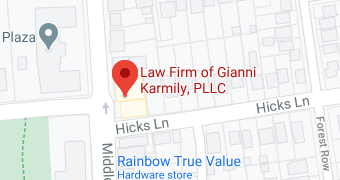Defense Lawyer Fighting For the Freedom of Clients Accused of Inchoate Offenses Throughout Nassau County
Everyone knows that you can face criminal charges for committing crimes. But many people are surprised to learn that they can also face criminal charges for simply planning, preparing, or attempting to commit a crime. These acts, which are seen as taking steps towards committing a crime, are referred to as inchoate offenses.
Each type of inchoate offense carries serious penalties. This is why if you are charged with an inchoate offense, it’s in your best interest to fight back with the help of experienced criminal defense attorney Gianni Karmily.
What Are the Different Types of Inchoate Offenses?
There are several different types of inchoate offenses in New York, including:
- Conspiracy
- Criminal Solicitation
- Attempt to Commit a Crime
Each of these offenses is a different criminal charge that carries grave penalties.
When Can You Face Conspiracy Charges?
A criminal conspiracy occurs when at least two people work together to commit a criminal offense. There are six degrees of conspiracy charges in New York. The degree you are charged with will depend on what type of crime you intended on committing and the ages of the people involved.
Agreeing to be involved in the commission of a crime is sixth-degree conspiracy, which is a class B misdemeanor. But if you agree to be involved in a felony crime or one of the parties involved in the commission of any type of crime is under the age of 16, it is fifth-degree conspiracy, which is a class A misdemeanor.
It charged as fourth-degree conspiracy, which is a class E felony, if the crime you agreed to commit was money laundering or a class B or C felony. It is also fourth-degree conspiracy if you agree to commit a felony with one or more parties under the age of 16. But if you agree to commit a class B or C felony with someone under the age of 16, it becomes third-degree conspiracy, which is a class D felony.
If you conspire to commit a class A felony, it is second-degree conspiracy unless the other parties were under the age of 16, in which case it is first-degree conspiracy. Second-degree conspiracy is a class B felony and first-degree conspiracy is a class A-I felony.
When Can You Face Criminal Solicitation Charges?
There are five degrees of criminal solicitation. The state may charge you with criminal solicitation in the fifth degree if you ask, demand, or attempt to persuade another person to commit a criminal offense. The crime becomes fourth-degree criminal solicitation if the crime you are asking someone to commit is a felony or if the person you are asking to commit any type of crime is under the age of 16. If you ask someone under the age of 16 to commit a felony, the crime is third-degree criminal solicitation.
Asking or attempting to persuade someone to commit a class A felony is second-degree criminal solicitation. If the person you are asking is under the age of 16, it is a first-degree criminal solicitation.
The lowest level of this crime, which is fifth-degree criminal solicitation, is a violation. The highest level, which is first-degree solicitation, is a class C felony.
When Can You Face Attempt to Commit A Crime Charges?
The state may charge you with attempt to commit a crime if:
- You had the intent to commit a specific criminal offense, and
- You engaged in some type of conduct in order to follow through on your intent to commit the offense.
It doesn’t matter that you failed at actually committing the crime—you can still face these criminal charges.
The level of this offense will depend on the nature of the crime you were attempting to commit. In most cases, the attempt to commit a crime is an offense that is one level lower than the crime you were attempting to commit. For example, if you were attempting to commit a class D felony, you may face class E felony charges for your attempt. There are some exceptions to this rule. For instance, if you attempt to commit certain class A-I felonies, you will face class A-I felony charges for your attempt.
How Can An Attorney Fight Inchoate Criminal Charges?
No crime was actually committed in inchoate offense cases. Because of this, many cases hinge on the defendant’s intent to commit a crime. Attorney Gianni Karmily will work tirelessly to prove that you never intended on committing a crime or being involved in the commission of a crime. He will aggressively pursue the best possible outcome in your case, whether that is a plea deal, reduced charges, dismissed charges, or acquittal.
Discuss Your Legal Options During A Case Evaluation With Our Long Island Inchoate Offense Lawyer
Have you been accused of committing an inchoate offense on Long Island? If so, seek legal representation from skilled inchoate offense attorney Gianni Karmily right away. Gianni is committed to helping his clients fight these accusations and avoid the legal penalties of a criminal conviction. To schedule a confidential case evaluation with the Law Firm of Gianni Karmily, PLLC, call our Great Neck office at (516) 630-3405 or our Hempstead office at (516) 614-4228.





